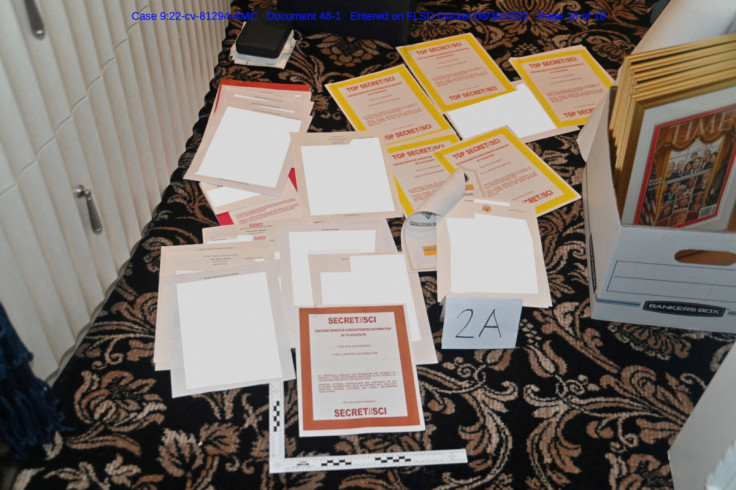Trump Asks U.S. Supreme Court To Intervene Over Seized Classified Records

Former President Donald Trump on Tuesday asked the U.S. Supreme Court to intervene in his fight with the Justice Department over classified documents seized from his Florida home as part of a criminal investigation into his handling of government records.
Trump filed an emergency request asking the justices to block part of a lower court's ruling that prevented an independent arbiter requested by Trump, known as a special master, from vetting more than 100 documents marked as classified that were among 11,000 records seized by FBI agents at the Mar-a-Lago estate in Palm Beach on Aug. 8.
The Atlanta-based 11th U.S. Circuit Court of Appeals on Sept. 21 repudiated a decision by U.S. District Judge Aileen Cannon, who had temporarily barred the department from examining the seized classified documents until the special master had weeded out any that could be deemed privileged and withheld from investigators.
The 11th Circuit also prevented the special master, Judge Raymond Dearie, from having access to the documents with classified markings, noting the importance of limiting access to classified information.
Trump's lawyers in Tuesday's filing said Dearie should have access to "determine whether documents bearing classification markings are in fact classified, and regardless of classification, whether those records are personal records or presidential records."
The Justice Department has "attempted to criminalize a document management dispute and now vehemently objects to a transparent process that provides much-needed oversight," Trump's lawyers added.
The court-approved Mar-a-Lago search was conducted as part of a federal investigation into whether Trump illegally retained documents from the White House when he left office in January 2021 after his failed 2020 re-election bid and whether Trump tried to obstruct the probe.
The investigation seeks to determine who accessed classified materials, whether they were compromised and if any remain unaccounted for. At issue in the 11th Circuit ruling were documents bearing classified markings of confidential, secret or top secret.
Cannon, presiding over Trump's lawsuit seeking to restrict Justice Department access to the seized documents, barred review of all of the materials and named Dearie to review the records, impeding the investigation.
On Sept. 15, Cannon, who was appointed to the bench by Trump, rejected the Justice Department's request that she partially lift her order on the classified materials as it impeded the government's effort to mitigate potential national security risks from their possible unauthorized disclosure.
The three-judge 11th Circuit panel included two judges appointed by Trump and one by former President Barack Obama.
Noting that classified records belong to the U.S. government, the 11th Circuit doubted Trump has any "individual interest" in them and that he "has not even attempted to show that he has a need to know the information contained in the classified documents."
The 11th Circuit also rejected any suggestion that Trump had declassified the documents - as the former president has claimed - saying there was "no evidence" of such action and that the argument was a "red herring because declassifying an official document would not change its content or render it personal."
In Tuesday's filing, Trump's attorneys said he had "broad authority governing classification of, and access to, classified documents." In an interview on Fox News last month, Trump again asserted without evidence that he declassified the documents and claimed he had the power to do it "even by thinking about it."
The three statutes underpinning the search warrant used by the FBI at Mar-a-Lago make it a crime to mishandle government records, regardless of their classification status.
Cannon had tasked Dearie to review all of the seized materials, including classified ones, to identify anything subject to attorney-client confidentiality or executive privilege - a legal doctrine that shields some White House communications from disclosure.
The document investigation is one of several legal woes Trump is facing as he considers whether to run again for president in 2024. New York state's attorney general last month filed a lawsuit accusing Trump and three of his adult children of fraud and misrepresentation in preparing financial statements from the family real estate company. The Trump Organization also is set to go on trial on Oct. 24 on New York state criminal tax fraud charges.
© Copyright Thomson Reuters 2024. All rights reserved.











